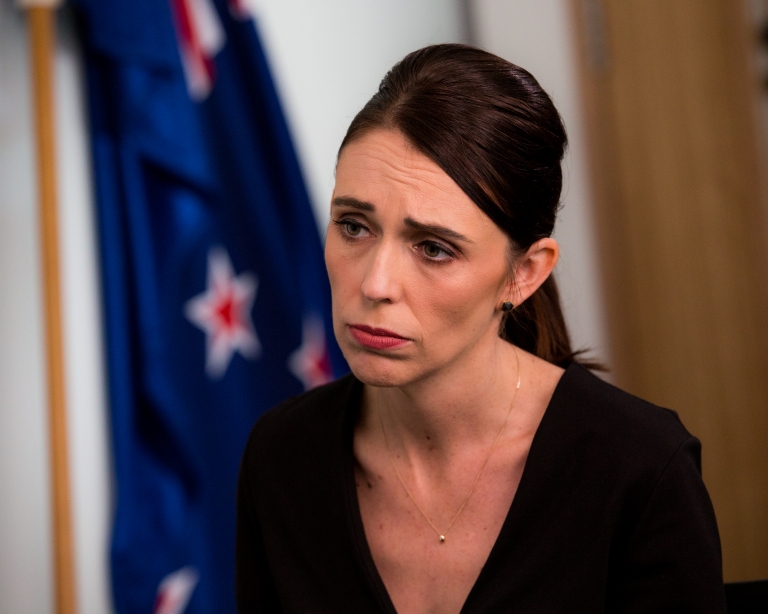Christchurch mosque shootings: New Zealand to ban military style weapons
New Zealand will ban all types of semi-automatic weapons used in the Christchurch attacks, Prime Minister Jacinda Ardern has said.
The country’s gun laws have been in the spotlight since 50 people were killed at two mosques last Friday.
Ms Ardern said she expected new legislation to be in place by 11 April.
All of the dead have now been formally identified, Commissioner Mike Bush confirmed. One man has been charged with one murder.
Australian Brenton Tarrant, a self-proclaimed white supremacist, is expected to face further charges.
He had obtained a firearm licence in New Zealand in 2017.
What will change and how soon?
“On 15 March our history changed forever. Now, our laws will too,” said the prime minister, who has said the killings were a terrorist attack.
“Related parts used to convert these guns into MSSAs are also being banned, along with all high-capacity magazines.”
She said an amnesty and a buy-back scheme would be imposed so the owners of affected weapons could hand them in.
Ms Ardern said the buy-back could cost “anywhere between $100m ($69m; £52m) and $200m. But that is the price that we must pay to ensure the safety of our communities”.
The lone gunman armed with semi-automatic rifles including an AR-15 killed people as they prayed on Friday. He is believed to have modified his weapon with a high-capacity magazine.
The prime minister said measures would be imposed to prevent a rush of gun buying before the law comes in.
As of 15:00 local time on Thursday, a range of semi-automatic weapons have been reclassified under the Arms Act, making them harder to buy.
“I can assure people, that there is no point in applying for such a permit,” she said.
What did the PM tell gun owners?
Addressing the impact on gun owners, Ms Ardern said she knew “many of you will have acted within the law”.
“When Australia undertook similar reforms, their approach was to allow for exemptions for farmers upon application, including for pest control and animal welfare. We have taken similar action to identify the weapons legitimately required in those areas, and preclude them,” she said.
Australia banned semi-automatic weapons after the 1996 Port Arthur massacre in Tasmania, in which 35 people were shot dead.
The guns subject to exemptions will include “0.22 calibre rifles and shotguns commonly used for duck hunting,” Ms Ardern said.
“I strongly believe that the vast majority of legitimate gun owners in New Zealand will understand that these moves are in the national interest, and will take these changes in their stride,” she said.
New Zealand’s police minister Stuart Nash said of the development: “I want to remind that it is a privilege and not a right to own a firearm in New Zealand.”
He encouraged gun owners with weapons affected by the ban to phone police to arrange bringing them into a police station.
How will the law be changed?
Ms Ardern said legislation to bring in the ban would be introduced when the parliament sits in the first week of April.
She said there would be a “short, sharp select committee process” for feedback on technical aspects of the law, and that changes to the Arms Act should be passed within the next session.
Once the amnesty period ends, anyone in possession of a banned weapon would face a fine of up to NZ$4,000 and three years in jail.

“Our actions, on behalf of all New Zealanders, are directed at making sure this never happens again”.
Jacinda Ardern
Prime Minister of New Zealand
What are New Zealand’s current gun laws?
Currently, the minimum legal age to own a gun in New Zealand is 16, or 18 for military-style semi-automatic weapons.
All gun owners must have a licence, but most individual weapons don’t have to be registered. New Zealand is one of the few countries where this is the case.
In order to own a gun legally, applicants for a firearm licence must pass a background check of criminal and medical records. Factors like mental health, addiction and domestic violence should be considered.
Once a licence has been issued, gun-owners can buy as many weapons as they want.
A special application must be made to police to own military-style semi-automatic weapons, pistols, or other restricted firearms.
Most guns don’t have to be registered, however – and because of this, police say they can’t be sure how many legally-owned firearms there are in the country.
As of June 2018, there were 246,952 active firearms licences including dealers and individual owners.
Source: BBC



